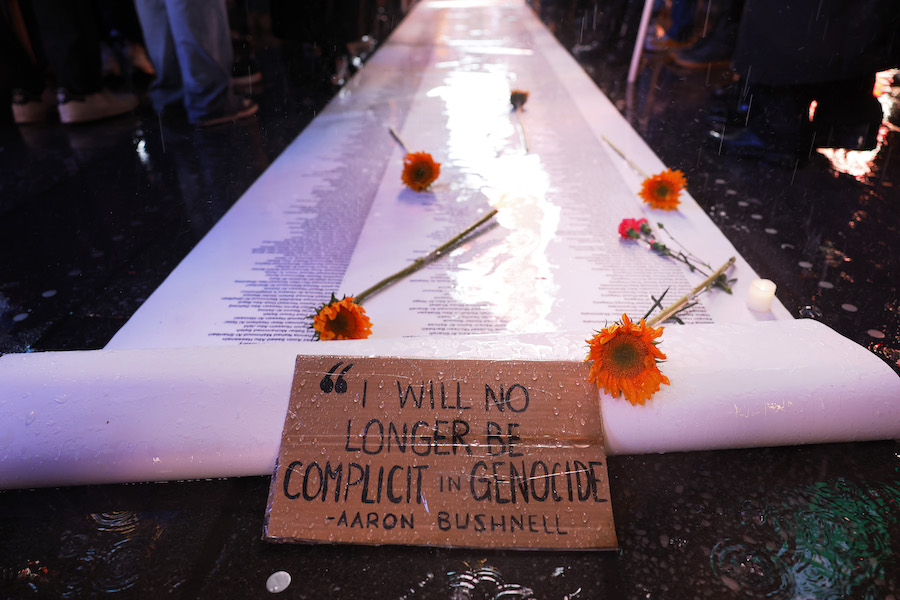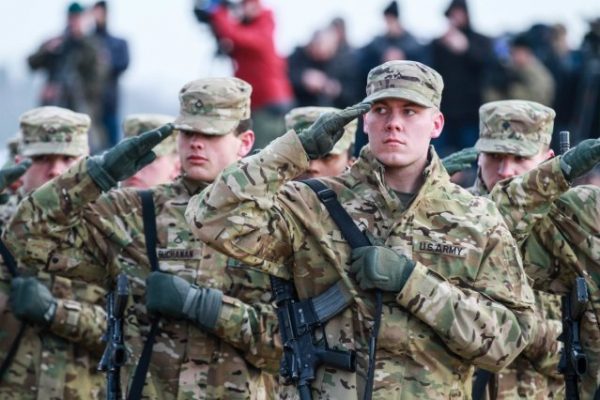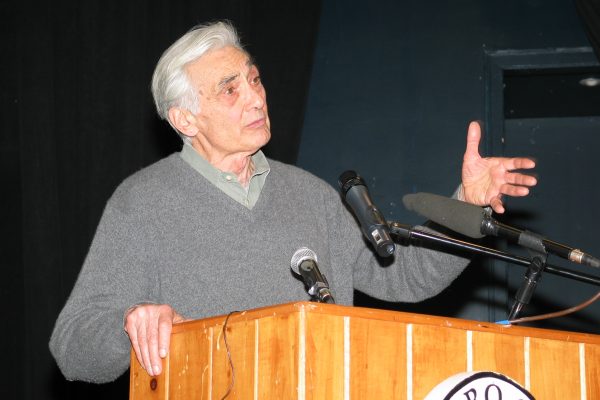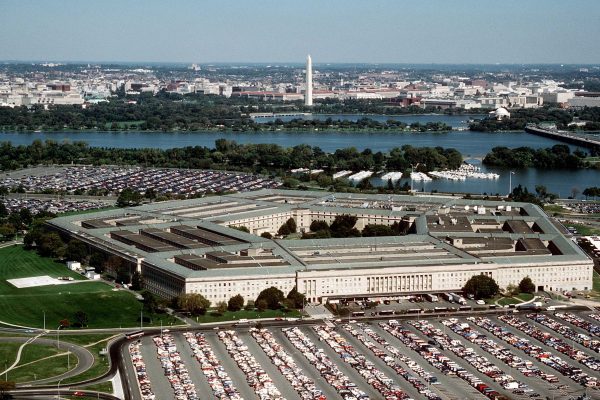The self-immolation of twenty-five-year-old active-duty U.S. airman Aaron Bushnell at the Israeli embassy in Washington, D.C., earlier this week was an extreme act of protest against the war in Gaza—a desperate plea to “free Palestine,” as he screamed while flames engulfed his body.
The incident evokes haunting memories of Vietnam, especially for those of us who served during that war and spoke out against it. The fact that Bushnell wore his uniform and called attention to his military service indicates he believed his status as a soldier would lend greater weight and significance to his protest. I feel only sadness that he was compelled to take such drastic action alone.
We don’t know what was in Bushnell’s mind when he decided to take his life, but clearly he hoped that his self-sacrifice would shake us out of our complacency and compel us to act to end the bloodshed.
Bushnell may have been aware of acts of self-immolation that occurred during the Vietnam War. The most famous was the immolation of Buddhist monk Thich Quang Duc in June 1963 in downtown Saigon near the Presidential Palace. Quang Duc sat in a lotus position and set himself on fire after being doused with gasoline. He burned to death without flinching. He and others were protesting persecution of the Buddhist community by the U.S.-supported Diem government. Five other Buddhist monks self-immolated in the following weeks, leading to the overthrow of the Diem regime. The shocking scene of Quang Duc’s immolation was immortalized in Malcolm Brown’s award-winning iconic photograph. The ghastly video of Bushnell burning himself may be the modern equivalent.
Other self-immolations have also occurred in the United States. In December, another protester of the war in Gaza, about whom little information has been released, self-immolated in front of the Israeli consulate in Atlanta. In March 1965 eighty-two-year-old activist Alice Jeanette Herz set fire to herself on a street in Detroit, calling attention to her antiwar message and urging others to work for peace. A few months later, thirty-one-year-old Quaker pacifist Norman Morrison self-immolated at the Pentagon, near the office of Secretary of Defense Robert McNamara, who later admitted the act was “an outcry against the killing that was destroying the lives of so many Vietnamese and American youth.” A week after Morrison’s death, Roger Allen LaPorte committed a similar act of self-immolation in front of the United Nations building in New York. In May 1970 graduate student and former ROTC cadet George Winne died of self-immolation on the campus at of the University of California San Diego. These were acts of supreme sacrifice, like Bushnell’s, to call attention to the brutality of war. They were intended to motivate others to speak out for peace.
I was one of many active-duty American soldiers who publicly opposed the Vietnam War and participated in the antiwar movement. I was not politically aware when I enlisted in 1968. I volunteered for the Army band to avoid being drafted into the infantry; I was hoping to skate by and get on with my life. My worldview turned upside down, however, when I realized what was happening in Vietnam. This was not a noble struggle against communism, as politicians said, but a war against the people of Vietnam. I was angry at being deceived. I was horrified to learn that the United States was bombing and destroying Vietnamese villages, that we were killing so many innocent civilians, including women and children.
I could not accept being part of such a policy and began to organize for peace while on active duty. I circulated petitions against the war in the barracks and joined other soldiers in marching in peace demonstrations. Those of us who protested as soldiers recognized that we might be punished for our dissent, and many of us were. But we felt compelled to act. We could not remain silent. We hoped that because we were soldiers, politicians and the media might take notice and perhaps show more respect for our antiwar message.
The GI peace movement extended throughout the military. Underground newspapers published by and for active service members appeared at nearly every major military base in the military and aboard dozens of ships. Dozens of countercultural antiwar coffeehouses were established outside major military bases. Military desertion and AWOL rates reached all-time highs. In Vietnam soldiers increasingly defied orders and refused to engage in combat, and the effectiveness of the U.S. military declined precipitously. Throughout the military morale reached rock bottom.
Those of us who dissented and resisted the war took risks because we could not participate in an unjust policy. We were motivated most of all by a desire to stop the killing and save lives. We felt responsible for the massive death and destruction our government was imposing on the people of Southeast Asia.
I’ve thought a great deal about my feelings then as I see the news now of Israel’s onslaught in Gaza, the massive bombing of densely populated neighborhoods and the deaths of thousands of innocent civilians, including many women and children. The situation today is different, of course. Israel is the main culprit in mounting the siege, but U.S. intelligence sharing is significant for Israel’s ability to wage war, and Special Forces units are reportedly in Israel providing technical support. Israeli troops are using American-made weapons, and our government is helping to fund the war. Without U.S. support Israel could not continue perpetrating its campaign of collective punishment against Gazans. We are enabling Israel’s actions and are therefore partly responsible. The Biden administration can and must do more to pressure Israel to end the carnage.
Like any state, Israel does have a right to defend itself. But the killing of noncombatants is never permissible regardless of the cause, and this is true for Israel as it is for Hamas or any other group. And waging war to counter terrorism—atrocities committed against civilians—is a fool’s errand, a trap that entangles the warring state in prolonged costly and debilitating wars of counterinsurgency and military occupation while sowing seeds of hatred and violence that will endanger its security.
Millions of people in the United States and around the world are active in the movement against war in Gaza, demanding a ceasefire and negotiations for a political solution. Despite the many protests and massive pressure against the war, however, the killing continues, and U.S. aid is still flowing to the Israeli military. Many young activists today are becoming frustrated and angry at their inability to stop the war.
Similar feelings of frustration and anger emerged during the Vietnam War, which continued despite massive protests against it. The movement against U.S. aggression in Indochina was the largest, most sustained and intensive antiwar campaign in American history. For a decade, as the U.S. war escalated, reached its furious peak, and then gradually diminished, millions of citizens in the United States and around the world campaigned continuously to bring the war to an end. During that era, as Tom Hayden writes in Hell No: The Forgotten Power of the Vietnam Peace Movement (2017), “Americans took to the streets in numbers exceeding one hundred thousand on at least a dozen occasions, sometimes reaching half a million.” From the first major protests and teach-ins in 1965 to the Indochina Peace Campaign against funding the war in the 1970s, opponents of the war engaged in public education campaigns, mass marches, picketing, prayer vigils, boycotts, student strikes, draft resistance, legislative lobbying, media and advertising, electoral campaigns, and more. Antiwar protest emerged from every sector of society and in every part of the country, including among many of us in the military.
It was disheartening to go to protests and engage in continuous action against the war and see little or no response from the Nixon administration. I remember vividly the November 1969 mass mobilization against the war in Washington, D.C. Half a million people converged on the Washington Monument to demand an end to the war. That rally and the preceding Vietnam Moratorium mobilizations gave the antiwar movement renewed momentum and generated enormous excitement and energy.
I was based at Ft. Hamilton in New York at the time and drove down to Washington for the rally. On the ride back that evening, every car on the New Jersey Turnpike seemed to be filled with protesters. The rest stops along the way felt almost like mini rallies. The whole day had been an empowering experience, but then we turned on the radio news and heard Nixon saying he paid no attention to the rally and would not be influenced by antiwar protest.
Our spirits sank at the thought that so large a demonstration could not move or influence him. How could the government ignore such a large outcry for peace? Little did we know at the time that the White House was in fact extremely concerned about the movement. Our protests had more power than we knew.
Years later, when Nixon, Henry Kissinger, and his senior aide, H. R. Halderman, published their memoirs, we learned that the Moratorium events and the Washington mobilization had the effect of preventing a threatened escalation of the war. The story of this little-known episode is presented masterfully in Stephen Talbot’s 2023 television documentary, The Movement and the “Madman.” The White House had delivered an ultimatum to the Vietnamese, threatening the possible use of nuclear weapons (the so-called “madman theory”) if North Vietnam did not end the war on American terms. When Hanoi balked, Nixon canceled the planned attacks, fearful that further escalation might lead to even greater antiwar disruption and social disorder.
The history of the Vietnam War shows that antiwar dissent limited U.S. options and helped to end the war. Public opinion against the war was a key variable in the strategic calculations of both the Johnson and Nixon administrations, as historian Melvin Small has argued. Political leaders made decisions about the conduct of the war based on their assessment of political impacts at home and the effects on antiwar dissent. This was “irrefutable evidence” of the movement’s impact, Small wrote.
It’s doubtful that Bushnell was aware of this antiwar history, because few people are. In our individualist culture, we learn about the historical achievements of leaders and individuals, not the social movements that support them. We learn about the civil rights movement, although often telescoped to the role of Dr. King alone, with limited reference to the many who worked with him in the struggle for freedom. We know little of social movements generally and even less about their strengths and weaknesses and how movements influence policy.
One of the great challenges of social movement organizing is to overcome the feelings of powerlessness that many activists have when their mobilizing efforts do not achieve the results they demand. When change does not come quickly or as completely as desired, activists can become demoralized. They may fall prey to the debilitating belief that nothing can be done, that protest and organizing are futile.
Part of the problem is that political change often occurs in unexpected and sometimes unrecognized ways. The process is often slow and incremental, with modest changes that fall short of activist demands. “It is always too soon to calculate effect,” Rebecca Solnit has observed. We can never know how our actions today may influence events tomorrow. When we apply pressure, we can’t predict how political establishments will respond, but partial steps can be significant and may lead to more substantive change.
History clearly shows that movements matter, and activist pressures can exert policy influence. Scholarly analysis shows that social movements are able to achieve change if they can build large coalitions, employ wise strategies, have compelling and unifying narratives, and are persistent in applying pressure for change.
It’s tragic that Bushnell felt it necessary to take his life in an extreme manner in order to be heard. His death sends a message for us to take continued action against the war and in support of Palestinian rights, to pressure our government to insist that Israel end the bloodshed. Our success in achieving these goals will depend on building an ever larger and more persistent movement of millions of people determined to work for peace.








